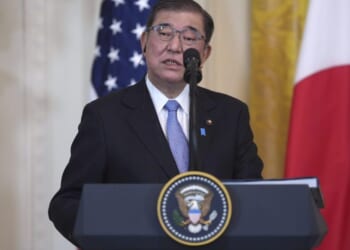
The emails at the top of my inbox filled me with dread. They came from the National Institutes of Health, and they put years of scientific research at risk.
When I opened those emails on a Friday evening in March, I found that the NIH had cancelled all my research grants, effective immediately, because they focused on gay, lesbian and transgender health. The agency described my research as “antithetical to the scientific inquiry.”
Let me set the record straight: I’m not promoting radical ideology, woke ideology, gender ideology or any kind of ideology at all. I’m a scientist. I work to keep people healthy.
And I’m outraged that the federal government has abruptly — and, I believe, illegally — terminated contracts to support work that I and hundreds of my fellow researchers have been pursuing to better understand and combat cancer, heart disease, maternal mortality, depression, Alzheimer’s disease and countless other threats to health and well-being.
On April 2, I joined several fellow scientists, the American Public Health Association, a reproductive health organization and a labor union whose members rely on NIH grant funding in filing a federal lawsuit to contest the arbitrary termination of research grants. The suit names several defendants, including Health and Human Services Secretary Robert F. Kennedy Jr.
We contend that the terminations amount to a “reckless and illegal purge” to stamp out scientific inquiry on topics and among populations that the administration disfavors, in violation of both congressional mandates and the NIH’s own strategic plan for advancing biomedical innovation.
This lawsuit is a fight for my professional survival. With my entire NIH portfolio wiped out, I cannot continue my work at the LGBTQ Health Center for Excellence unless donors step forward with multi-year commitments.
But this is about far more than my own future. This is a stand against the erosion of scientific freedom. And it’s a stand for better health for every one of us.
NIH funding has contributed to the development of virtually every therapeutic drug approved by the Food and Drug Administration. These drugs have greatly improved life expectancies for people with cancer, HIV, heart disease and more such ailments.
Medications matter a great deal, but public health advances have been an even bigger contributor to improved health and longevity. And that progress, too, comes from NIH-funded research.
Some of our research may seem narrowly targeted. For instance, we may study why a particular population has a higher-than-expected risk of colon cancer. If you’re not a member of that group, you might question why your tax dollars should fund such research.
One answer is that we are all connected. Your child’s teacher may be a member of that group. Or your boss, or the chef at your favorite restaurant. If they are out of work for months, suffering from illnesses that could have been averted, your own life will be disrupted as well.
Another answer is that scientific progress is often transferrable. If we can identify and address the cause of poor health in one population, we may be able to apply those strategies to improving health for all.
Perhaps the most important answer — and the reason I’ve joined this lawsuit — is that science should not be subject to political whims.
These terminated National Institutes of Health grants were funded only after an extremely rigorous scientific review process. Panels of scientific experts deemed this work critical to protecting and advancing health for all Americans, which is why we received multi-year contracts. Based on those contracts, we hired staff, bought equipment, conducted community outreach and began our work.
Now, unknown bureaucrats are tearing up those contracts based on political judgments.
Research focused on gay and transgender health, like my own project, are just a fraction of the toll. Vital work to test new vaccines, improve access to lifesaving drugs, identify new risk factors for Alzheimer’s disease, mitigate the impact of cancer on low-income Americans and more were also abruptly cancelled. On top of that, Kennedy this week began purging scientific leadership and gutting offices dedicated to protecting health across Health and Human Services.
These actions do not serve to make America healthy again. On the contrary, they leave us highly vulnerable.
Nor are these moves fiscally responsible. By ripping up multi-year contracts with academic researchers mid-stream, the NIH is squandering its investments to date. In some cases, much of the work has been completed and the has been data collected — but without funding to analyze and write up the results, the findings will never see the light of day.
Though its investments represent just a tiny fraction of the federal budget, the NIH is the world’s biggest funder of biomedical research. It is an engine of both scientific progress and prosperity; every dollar of research it funds leads to $2.56 in economic activity, a powerful multiplier effect that benefits every state in the nation.
These arbitrary grant terminations — conducted without the careful, individual review required by law — put all this at risk. When political rhetoric replaces scientific research, every American suffers. Only by standing together and embracing the full range of scientific inquiry can we secure a healthier, more just future for all.
Dr. Brittany Charlton, an epidemiologist, is an associate professor and founding director of the LGBTQ Health Center for Excellence, which is based at Harvard Pilgrim Health Care Institute in partnership with Harvard T.H. Chan School of Public Health.










